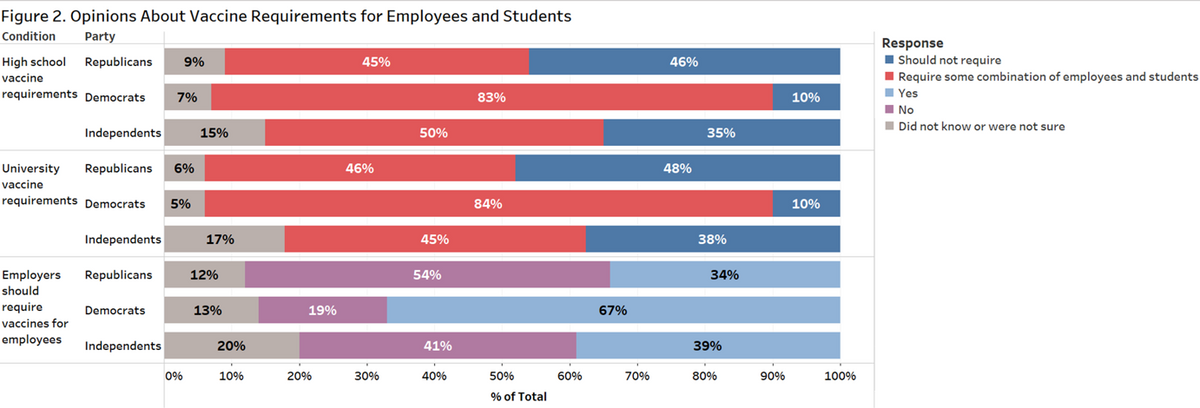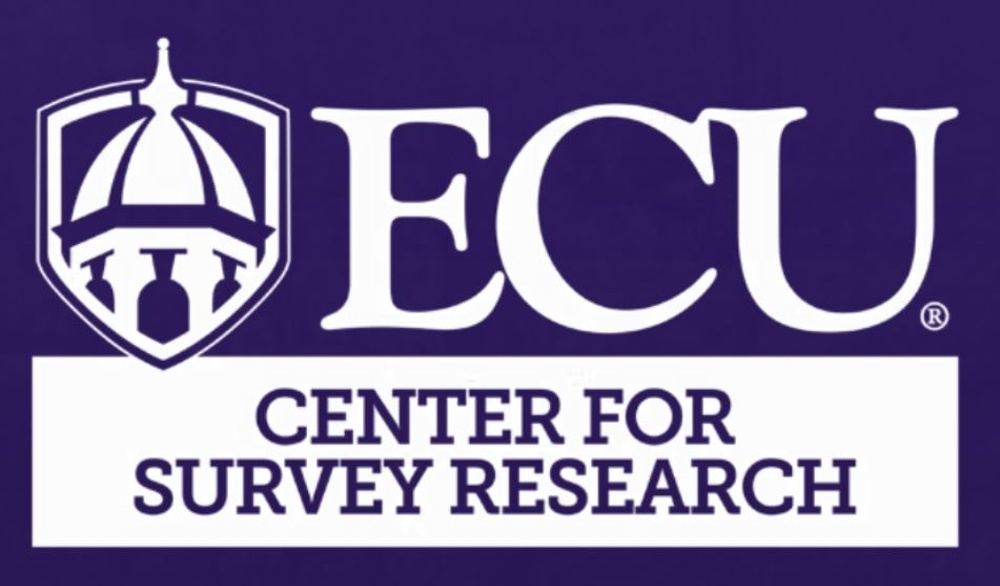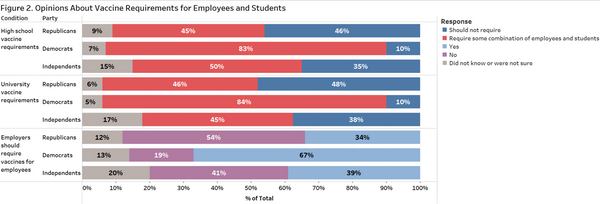Were pandemic measures, such as stay-at-home orders and face-covering requirements, a violation of personal freedom or a necessary response to protect public health? What about potential vaccine requirements? As Americans look forward to celebrating Independence Day and its promise of life, liberty and happiness, a new survey from East Carolina University’s (ECU) Center for Survey Research (CSR) asked U.S. adults nationwide to consider questions on life and liberty during a global pandemic. The results of the survey (conducted June 14-19, 2021 with 1,105 U.S. adults) reveal not only significant differences in opinion along party lines, but also within the Republican Party.1
Summary Findings
Unlike Democrats who were largely unified, Republicans were split on whether stay-at-home orders, face-covering requirements, and quarantine mandates for out-of-state travel wrongly took away people’s personal freedom or were necessary to protect public health. By comparison, overwhelming percentages of Democrats saw the measures as necessary to protect public health. Similar patterns emerged on vaccination requirements, with Republicans more divided than Democrats. Independents sided more with the position that stay-at-home orders, face-covering requirements, and quarantine mandates for out-of-state travel were necessary to protect public health but were divided on questions about COVID-19 vaccination requirements.
In response to the findings in the report, Dr. Peter Francia, Director of the ECU Center for Survey Research, commented, “COVID-19 measures and vaccinations remain significant topics of controversy. Most interesting, however, is that disagreements around these issues do not run strictly along predictable party lines, but also divide Republicans against Republicans. At the heart of that division is a debate, as old as the republic, over personal freedom and public safety.”
Full Results
1. On stay-at-home orders:
Among self-identified Republicans, 42% responded that stay-at-home orders wrongly took away people’s freedom as compared to 42% who answered that stay-at-home orders were necessary to protect public health (with 11% who did not agree with either statement and 5% who did not know or were not sure).
By comparison, among self-identified Democrats, 8% responded that stay-at-home orders wrongly took away people’s freedom as compared to 85% who answered that stay-at-home orders were necessary to protect public health (with 4% who did not agree with either statement and 3% who did not know or were not sure).
Among independents, 21% responded that stay-at-home orders wrongly took away people’s freedom as compared to 61% who answered that stay-at-home orders were necessary to protect public health (with 2% who did not agree with either statement and 16% who did not know or were not sure).
2. On face-covering requirements:
Among Republicans, 41% responded that face-covering requirements wrongly took away people’s freedom as compared to 45% who answered that face-covering requirements were necessary to protect public health (with 11% who did not agree with either statement and 3% who did not know or were not sure).
Among Democrats, 6% responded that face-covering requirements wrongly took away people’s freedom as compared to 88% who answered that face-covering requirements were necessary to protect public health (with 5% who did not agree with either statement and 1% who did not know or were not sure).
Among independents, 21% responded that face-covering requirements wrongly took away people’s freedom as compared to 62% who answered that the face-covering requirements were necessary to protect public health (with 7% who did not agree with either statement and 10% who did not know or were not sure).
3. On quarantine mandates for out-of-state travel:
Among Republicans, 39% responded that quarantine mandates for out-of-state travel wrongly took away people’s freedom as compared to 52% who answered that quarantine mandates for out-of-state travel were necessary to protect public health (with 6% who did not agree with either statement and 3% who did not know or were not sure).
Among Democrats, 9% responded that quarantine mandates for out-of-state travel wrongly took away people’s freedom as compared to 86% who answered that quarantine mandates for out-of-state travel were necessary to protect public health (with 2% who did not agree with either statement and 3% who did not know or were not sure).
Among independents, 19% responded that quarantine mandates for out-of-state travel wrongly took away people’s freedom as compared to 65% who answered that the quarantine mandates related to out-of-state travel were necessary to protect public health (with 6% who did not agree with either statement and 10% did not know or were not sure).

Not only are Republicans divided on past responses to COVID-19, but they are also divided on issues in the present, such as COVID-19 vaccination requirements for students and employees in high schools and universities. On whether employers should require employees to receive a COVID-19 vaccine, Republicans were more unified in their opposition.
4. On whether high schools should require students and employees to receive the COVID-19 vaccine when school resumes in the fall:
Among Republicans, 46% responded “no” on whether high schools should require students and employees to receive the COVID-19 vaccine when school resumes in the fall as compared to a combined 45% who answered “yes” for students only, employees only, or both students and employees (with 9% who did not know or were not sure).
Among Democrats, 10% responded “no” on whether high schools should require students and employees to receive the COVID-19 vaccine when school resumes in the fall as compared to a combined 83% who answered “yes” for students only, employees only, or both students and employees (with 7% who did not know or were not sure).
Among independents, 35% responded “no” on whether high schools should require students and employees to receive the COVID-19 vaccine when school resumes in the fall as compared to 50% who answered “yes” for students only, employees only, or both students and employees (with 15% who did not know or were not sure).
5. On whether universities should require students and employees to receive the COVID-19 vaccine when school resumes in the fall:
Among Republicans, 48% responded “no” on whether universities should require students and employees to receive the COVID-19 vaccine when school resumes in the fall as compared to a combined 46% who answered ”yes” for students only, employees only, or both students and employees (with 6% who did not know or were not sure).
Among Democrats, 10% responded “no” on whether universities should require students and employees to receive the COVID-19 vaccine when school resumes in the fall as compared to 84% who answered “yes” for students only, employees only, or both students and employees (with 5% who did not know or were not sure).
Among independents, 38% responded “no” on whether universities should require students and employees to receive the COVID-19 vaccine when school resumes in the fall as compared to 45% who answered “yes” for students only, employees only, or both students and employees (with 17% who did not know or were not sure).
6. On whether employers should require employees to receive a COVID-19 vaccine:
Among Republicans, 54% responded “no” on whether employers should require employees to receive a COVID-19 vaccine as compared to 34% who answered “yes” (with 12% who did not know or were not sure).
Among Democrats, 19% responded “no” on whether employers should require employees to receive a COVID-19 vaccine as compared to 67% who answered “yes” (with 13% who did not know or were not sure).
Among independents, 41% responded “no” on whether employers should require employees to receive a COVID-19 vaccine as compared to 39% who answered “yes” (with 20% who did not know or were not sure).

Implications
Policies concerning how to handle the spread of COVID-19 have been and remain a source of public controversy. However, as the results in this survey indicate, the public debate exists not only across party lines, but also within the Republican Party. Democrats, in contrast, are largely unified in siding with the position that government restrictions were necessary to protect public health, and that high schools, universities, and, to a lesser extent, employers should require vaccinations. As the national parties look to craft their respective messages on past and present COVID-19 policies, the results from this survey make clear that Republicans face a greater challenge given the party’s internal divisions over the tension between personal freedom and government restrictions designed to protect public health.
Other Findings
Attitudes about COVID-19 show a relationship with public opinion on the job approval rating of President Joe Biden. Overall, the results from this survey show that 48% of Americans approve of the job that Joe Biden is doing as president compared to 41% who disapprove (with 11% who are neutral or have no opinion). Yet, in a further sign of the politicized nature of COVID-19, the results also reveal that among respondents who answered that COVID-19 was a problem and that government needed to do more initially to stop it from getting worse, 63% approve of the job that Joe Biden is doing as president. By comparison, among those who did not see COVID-19 as a problem at all or that COVID-19 was a problem but governments overreacted to it, just 23% approve of the job that Joe Biden is doing as president. Likewise, on whether the nation is generally headed in the right direction or off on the wrong track, 44% of Americans answered that the United States is headed off on the wrong track compared to 42% who responded that the nation is headed in the right direction (with 14% undecided). Perhaps due to declining rates of COVID-19 infection rates nationally, respondents who answered that COVID-19 was a problem and that government needed to do more early to stop it from getting worse, 52% answered that the nation is headed in the right direction compared to 24% who did not see COVID-19 as a problem at all or that it was a problem but governments overreacted to it.
Notes
1. Republicans include independents who lean towards the Republican Party. Democrats include independents who lean towards the Democratic Party. Independents are those who do not lean toward either the Republican Party or Democratic Party.
The authors thank Brittany Meier and Baekkwan Park for their assistance on this report.
Methodology
This report was based on a mixed mode of 1,105 responses from telephone and the Internet. Respondents contacted by telephone came from a nationwide random sample of adults (18 years or older) drawn from the 50 states and the District of Columbia. Live calls (N=90) were conducted and completed by Dynata (https://www.dynata.com/). Of those 90 completed live calls, 84 came from cell phones and 6 from landline phones. An additional 523 completed telephone calls came from an Interactive Voice Response (IVR) system of landline phones. The remaining 492 respondents completed this survey through an online panel provided by Lucid (https://luc.id/). To ensure data quality for the online portion, the questionnaire included a validity check question to confirm that respondents were reading the questions carefully before answering them. The combined sample of respondents were weighted by age, gender, race, education, 2020 voting behavior modeling, and mode. The credibility interval, much like a margin of error, is plus or minus 3.1 percentage points and takes design effects into consideration. For additional information, please see the ECU-CSR’s AAPOR Transparency Initiative report.






